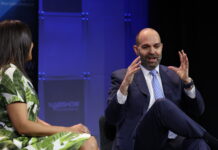
It’s clear musicFIRST has been lobbying the mainstream media to take up its case against the radio industry. They have found a willing ally at The Washington Post. An opinion piece in The Post written by Sonny Bunch starts out with this sentence, “Every time you listen to the radio you’re partaking in the exploitation of musicians.”
Bunch takes the approach that the game has changed and the NAB’s argument that free radio airplay and promotion for artists no longer leads to increased album sales. As if the failing business models of record labels is now somehow the radio industry’s fault.
But Bunch takes it even further. He says not only was this setup wrong from the beginning, it’s morally wrong. “All of this is to say that in the new system, the old assurances from the NAB and its allies don’t make a ton of sense. The question we should be asking ourselves is whether they ever really made sense in the first place. Not from an economic perspective, necessarily. But from a moral one.”
The NAB’s Dennis Wharton told Radio Ink last night, ‘This is more of the same tired nonsense that the labels have spouted for years. The fact is that local radio has jump-started and sustained the careers of countless artists. Many of those same artists have gone on to sue their labels for cheating them out of payments owed to them.”
Because a radio station can play an artist or a song as many times as it likes is fundamentally wrong according to Bunch. “It’d be like saying every broadcast network should have the right to air The Sopranos so long as it pays HBO a couple of bucks a day. Or it’d be like allowing a website (say, the Huffington Post) to republish a 5,000-word investigative piece by The Washington Post or a 1,200-word movie review by the New Yorker or a 60-word listicle by BuzzFeed, racking up advertisement revenue in the process, so long as it paid a few pennies per thousand clicks to the person who wrote it, regardless of whether the author (or the organization that paid for the work originally) had any interest in it appearing elsewhere.”
Bunch says The Fair Play Fair Pay Act musicFIRST is pushing in Congress is a start, and he adds it’s good that someone is fighting for performers to be compensated by radio stations that profit off of their work. “But I hope for a day when an artist has a total right to his labor and can say no to the radio stations that profit from it without permission. Sure: No musician has a right to a certain amount of pay for a certain amount of work. Similarly, though, no business has a right to your labor if you don’t want to sell your labor to it.”
Bunch doesn’t get into any of the facts about how important it is to artists that their songs play on the radio (artists thank radio for playing their music at nearly every concert). Or, how artists react when they first hear their song on the radio (they always remember exactly where they were the first time, just ask one). Or, that the goal of the artist is actually to get on the radio, not on Pandora or Spotify or Apple Music (so their music can be heard by the masses). Or how radio stations promote their concerts – at no charge – to help them fill arenas when they come to town (not every artist is a superstar like Taylor Swift).
Remember what Ronnie Dunn and Gary Overton said?
Remember what SONY Music Nashville Executive Vice President Steve Hodges said?
Remember what Kenny Chesney said in our Cover Story interview?
The Bunch Opinion, you can read HERE. Details about the NAB’s Local Radio Freedom Act and its fight against the musicFIRST tax can be found HERE









Having worked in both the radio and music businesses, I can tell you that the argument is a false one. It has been proven over and over that radio airplay drive music sales. Even digital. There is absolutely NO DOUBT about it. None. HOWEVER, every time a radio station plays a song, it is a 3 minute long commercial for that artist. Since radio stations make their income from SELLING AIRTIME, and they do not charge the labels or artists for airing their 3 minute long commercial, the artists are really making out. Royalty from playing one song one time, would be a penny or a fraction thereof. A 3 minute long commercial would cost a lot more than that, and in larger markets, hundreds of dollars. So, if the record companies want to make up their losses of royalties by charging stations for playing their music, I think it would be only fair for radio stations to start charging labels the standard advertising rates for all of the time they’ve been giving away for free. I can imagine in New York City, the conversation would go like this: “We played this song 3 times today. Here’s your 3 cents. Now, you owe us for 10 minutes, here’s your bill for $1000.00. So, exactly who is making out here?
As good a comment on the subject as I’ve heard.
Drive the last “free” music medium out of business – that’s the goal. And believe me, a licensing fee that takes any kind of percentage of revenue will put half the music stations out of business. Just what why want. Ask any artist – they are getting squat from their labels. Live performance is where the money is. Oh, and then there are those 360 deals! How about Congress allows us to charge for adds and spins? Betcha the labels back off fast. Fair is fair right?
Every week, the Program Director of any prominent radio station that plays current music will be inundated with calls from artists, managers and record labels – begging for airplay. The more that PD hold outs, the harder the sell becomes. Most PD’s choose to have a Music Director because the volume of calls, requests and visits gets overwhelming to the point where the PD cannot do his/her job. Fielding music requests from labels is practically a full-time job. Even a prominent artist who has been putting out hits for years will call and ask for more airplay so they can get their 10th number one.
Why would they be begging us for airplay if they were getting a bad deal?
“Hey! We’re doing you a big favour!” has been the bleat of broadcasters forever when addressing the refusal to pay the performers.
Radio ownerships have no need of or desire to acquire a conscience on the matter, either.
And why would they? “It’s business.” they retort – a response that, for some reason, is accepted as perfectly normal and rational. And, at all times.
Although this is a blotch on radio’s morality-chart, the issue will still be hard fought forever.
Powers-that-be will likely hold the soiled and greedy ingrates at bay.
But everybody – including those with the vested interests – already knows whose oxen are being gored.
Listen to the artists – they will tell you we ARE doing them big favours. And last I checked, we already pay plenty in royalties for all that ‘free’ music we freeload. It’s not radio’s fault if the people collecting the cash for the songs we pay fail to pay the artists. Maybe that should be investigated, if some 3rd parties are profiting for doing nothing but collecting money from radio stations for someone else’s work. Nah, that’d be crazy and might unveil a corrupt recording industry …
Radio stations pay royalties to songwriters, but not to performers. Each piece of music is covered by two copyrights: the composition (owned by the songwriter(s) and/or publishing company, represented by ASCAP, BMI, or SESAC), and the performance (owned by the performer and/or record company, represented by SoundExchange).
Every other form of music media in the US (Internet, cable, & satellite) pays royalties to both sets of owners. Broadcasters in virtually every other country in the world pay royalties to both.
In the US, broadcasters have successfully lobbied Congress since the 1940s for an exemption to this worldwide norm. The more you dig into the issue, the harder it is to justify the existing situation.
Sure, promotion has value. But the global consensus has always been that the recorded music that most stations build their entire business model on top of has value as well.
Hey Bill – did I misunderstand Payola? Was that where Radio Stations illegally gave money to the labels to have them supply us with their product? My understand is that it would still be going on if there wasn’t a LAW against it.
And it’s funny that the two biggest selling albums of the last DECADE were from artists that refused to provide their music to the streaming services – which they felt competed with their sales efforts – but were only two happy to have their music on Radio.
But I guess your right, Adela, Taylor Swift and Radio are the ones that are wrong about this.
Robert T Robinson works in Canada where there are completely different set of laws and regulation. He’ll never understand the inner workings of American Broadcasting or the Music Industry.
Follow the money. Nowhere is it mentioned that Amazon’s Jeff Bezos owns the Washington Post – and of course Amazon sells Music – and even started their own standalone Video Subscription Service for $1 below the cost of Netflix. One wonders if a Subscription Audio Service (or a combo Audio/Video Service) is far behind?
Randy:
Follow the money in radio, too. Nowhere at InsideRadio.com does it say that it’s owned by iHeartMedia – so your logic applies for that venue. Then we have all other radio publications hosting conventions, which make profit from stations playing popular songs. It benefits each publication to “report on the hits.” (How many column inches are devoted to new artists?)
On another note: Radio plays only those songs it feels draws an audience. That’s why there are short playlists, so few adds each week and familiar tunes far outnumbering new songs. To hear “radio is promoting an artist” is disingenuous, when it really is using familiar artists to extend TSL and cume.
Performance royalty payment now is about the radio industry in parity with other music sources that are forced to pay.
If you are comparing Inside Radio to the Washington Post, I guess that’s your issue. Inside Radio is a trade publication about an Industry. The Washington Post is not.
Of course Radio only plays songs that it feels will draw an audience. And Record Companies only promote songs they think will draw an audience (and sales) as well. Your point?
Incorrect about parity. Pearl Jam has often stated they do all these “cool things” with SiriusXM, yet they never get a reaction from it. Asking, in fact, does anyone listen?
They know the power of Radio.